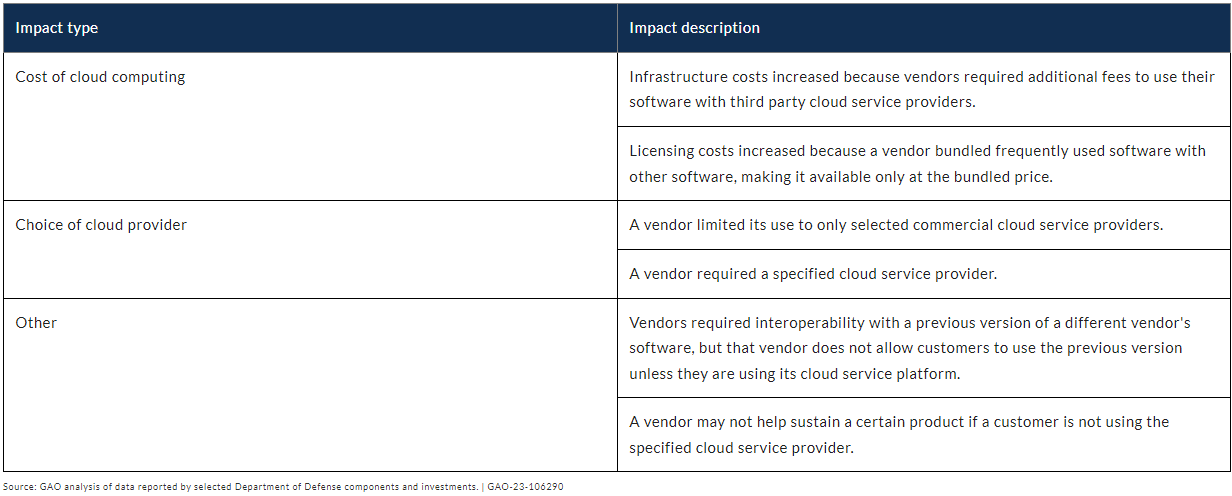|
The GAO analyzed six randomly selected Department of Defense (DOD) programmes based on fiscal year 2023 budget size and grouped the investments into three groups — greater than $100 million, between $100 million and $10 million, and between $10 million and $1 million, with key findings that vendors:
Not a good story, although no doubt a common one that, given CIO's and CTO's relentless push to the cloud in recent times, (fully endorsed by doe-eyed executive committees and boards clambering to chat that 'yes, we're doing that too') are unlikely to get air time in that respect - just glowing reports of progress and ever increasing (perhaps slowly) 'number of migrated applications' statistics. Now we're not saying there is no place for the cloud - there is - but per the recommendations of the GAO from this report, it needs to be formulated through guidance and plans that fully address identifying, analyzing, and mitigating the impacts of restrictive software licensing practices on cloud computing efforts. And therein is the problem. Many CIO's and CTO's would rather rely on vendors or consultants recommendations rather than their own in-house expertise across IT, SAM and procurement teams who know in detail what - and where - costs and impacts are likely to arise. So if nothing else, perhaps try to use the GAO's Examples of Reported Restrictive Software License Practices table below as a minimum checklist of what to consider with your next cloud migration programme - it might bring some future issues to light and maybe even save just a little grief! 
0 Comments
If it seems that your vendors are unwilling (they'll say unable) to accept a termination for convenience clause these days, you're not alone. Often this will be justified by citing their companies accounting rules and practices aligned to the 2014 revenue recognition changes post Enron where they'll refer as below:
What they don't refer to is the fact that where termination charges are provided full contract revenue can be recognised:
Of course the "substantive" qualification is the issue - just how substantive should it be? Well there are no firm guidelines in that respect, other than simply compensating a supplier for services or deliverables provided up to the effective date of (early) termination will not be regarded as substantive. Guidelines only advise that "judgment has to be applied with consideration given to quantitative and qualitative factors". Government contracts typically require a termination for convenience clause and will state (in part) something similar to the below:
Having negotiated the termination for convenience clause we're now comfortable that all is good right? Well no, there are further issues to contend with. If (and thats a big 'if') the matter gets to court there would likely be consideration as to whether the contract was 'illusionary' based on the very right to terminate at will, or that the termination was not enacted in 'good faith', or even as far as not following the termination right explicitly which opens the door to damages! So what other options are there? Well that of course depends on what exactly is being contracted, but consider the following:
Key to all of the above is explicit language that clearly defines the criteria by which the clauses can be invoked - when things break down to termination your vendor will not be overly receptive to subjective positions, ambiguities, or plain old opposing points of view. And while the lawyers are endlessly debating the virtues of limitations of liability and insurances and everything else basically immaterial just ask yourself when you actually last went to court, and then ask what typically goes wrong with your contracts - invariably its performance based and for that, you just need an appropriate provision for ... ... a hasty, unequivocal exit, at the lowest possible cost!You've been there right ... in a meeting, time for the mandatory introductions, and the chair says "now from Procurement we have ..." ... so you shake your head (not visibly) and dutifully introduce yourself, thinking "They still have no idea!" So lets get a few things straight. Sourcing isn't Procurement. Sourcing ultimately involves Procurement, but other than that, it's quite different. And while we're on the subject, what's with 'Category Management?' Really?? ... to our thinking, 'Category Management' is just an unnecessary classification - sure - we work in categories, be it IT, Marketing, Stationary, Travel ... whatever, but it's the Sourcing label that defines the function. Well then, if it is different, what is Sourcing ? Sourcing, fundamentally is a discipline (much like, and in fact premised on, Project Management) - it has methodology, it has process, it has discipline, and it has rigour (for example, CIPSA). Not that Procurement doesn't - but Procurement ultimately follows the framework that Sourcing puts in place. Rather than straight 'buying' a good Sourcing practitioner will firstly work closely with the business to ensure there is an understanding (and proper framing and presentation) of requirements, development of a Market Strategy (who to approach, and how it should be constructed - RFI, RFP, RQT ...) , all backed up by a practice of relevant and credible assessment and evaluation (and that means no less than an objective, defensible process qualified by accurate data and irrefutable artefacts), followed by the subsequent qualification of supply (being full and complete due-diligence), with expert negotiation and agreement of (favourable!) contractual terms, plus induction of this new supply (and if you're a regulated institution, don't forget your obligations here - your license could be at stake). So where is Procurement in all of this? Procurement then steps in to make sure the ongoing acquisition of contracted products or services occurs within the framework of the Sourcing arrangements that have been put in place, tracking the metrics, monitoring the costs, measuring delivery - keeping the Supplier to their commitments. But let's hear from the practitioners out there - all you Sourcing and Procurement people doing the job day in / day out - where would you classify your role, what differentiates your function, how might you describe what you do? We're keen to hear your view - share your thoughts ...
Well the December rush is now behind us although not without the usual lessons, primarily that the end of year for some organisations (US corporates perhaps!?) offers much more opportunity for negotiation than you might otherwise get at other times of the year. Keeping informed across the performance of such key (or where possible all) supplier companies provides an insight into just how much pressure there is likely to be on their sales and account teams, and it may well be timely to go beyond the usual boundaries for closing a deal. The 'last minute' can present a surprising transformation of firstly outlandish requests into what are suddenly 'our most valued partner' incentives - anything from an array of additional 'you need/must have' product to the inclusion of extensive 'our skins in the game' professional and/or project services (of course a mere placeholder without Key Personnel), to the real, last gasp, what about big '$$$' financial offsets (and think large - this year, capital 'L') real value, real money in YOUR pocket), all of which can make a borderline business case (and with unexpected funds in your budget, possibly others) pretty attractive to your executive/board. So a useful tactic can be to defer those initiatives that are unlikely to get the go ahead until the vendors end of quarter - or preferably end of the financial year for most leverage - and really test what's on the table. As that time honoured saying of Project Management goes: 'if it wasn't for the last minute, nothing would happen!'
|
<
>
Archives
November 2023
|
|
Unravelling license complexity for Business
ACN 623 529 751 |
Privacy Policy | Terms of Use
|


